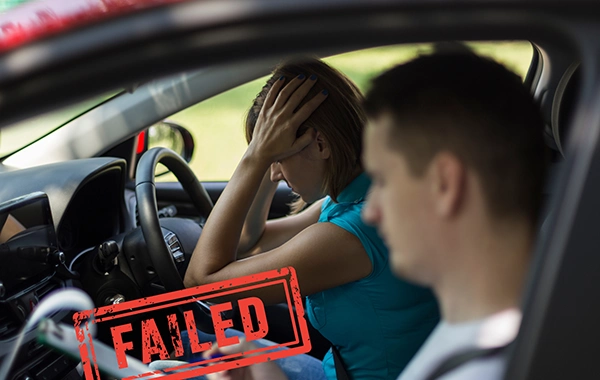When Can I Rebook My Driving Test After Failing?
Found out you didn't pass? Don't panic. Here is everything you need to know about the DVSA 10-day rule and how to get your next test date secured.
The 10-Working Day Rule and Rebooking Times
If you’ve just found out that you didn’t pass your practical driving test, it’s completely normal to feel disappointed — but don’t be too hard on yourself. You’re far from alone. The national average pass rate is only around 48%, meaning more than half of learners need more than one attempt to succeed.
In most cases, failing isn’t about poor driving — it’s often down to a single major fault or a momentary lapse in concentration on the day. The good news? Every test, even an unsuccessful one, gives you valuable feedback that helps you become a safer, more confident driver. And as you’ll see further down the page, most instructors wouldn’t have presented you for your test if they didn’t believe you were ready — so take comfort in knowing you had the ability; it just didn’t come together on the day.
At Andrew’s Driving School, we’re proud of the many students who pass their test — but we’re also honest enough to say that some do fail, and that’s okay. Those stories don’t always get shared, yet they’re an important part of learning to drive. Every experience, pass or fail, is progress toward becoming a capable and confident driver
You didn’t fail — you just found one more way to become a better, safer driver.
One of the most common mistakes learners make after failing their test is trying to book again too soon. The Driver and Vehicle Standards Agency (DVSA) has clear rules about when you can rebook — understanding them helps you avoid wasted time or extra fees.
Wait 10 Working Days
You can rebook immediately after your result, but the new test date must be at least 10 working days away. Use this time to fix faults.
To help you improve
The DVSA requires this gap so you can act on your test report, gain experience, and rebuild confidence before retaking the test.
Give 10 Days Notice
Give at least ten full working days’ notice to avoid losing your fee if you need to change your date.
🚗 Make the Wait Count: Fixing the Top 10 Test Faults
The 10 working days before you can rebook your driving test is your best opportunity to build on what went wrong. Reviewing your faults with your instructor and targeting your practice can make all the difference. Remember: many learners stress about manoeuvres, but most test failures come down to basic awareness and judgment.
Learner Insurance
Need to build your confidence for the next test? Private practice in a friend or family member’s car can make all the difference. To keep things simple and safe, you can grab a discounted rate on learner insurance here. Best of all, this cover protects the car owner—if anything happens, their No Claims Discount remains completely unaffected.
10 Most Common Reasons for Failing the Driving Test (and How to Fix Them)
Many learner drivers worry most about the manoeuvres — but most test faults actually come down to observation, awareness, and judgement. With focused lessons and good feedback, these are all things you can easily improve.
1. Observation at Junctions
Our Tips:
Practise scanning rather than staring straight ahead. Keep checking your mirrors and surroundings, and wait for a clear, safe gap before pulling out. Observation is key to safe driving and passing your test.
2. Mirrors – Changing Direction
Our Tips:
Always check your mirrors and blind spots before changing direction or position. Build this into your routine until it becomes automatic.
3. Not Moving Off Safely
Our Tips:
Stick to the Mirror, Signal, Manoeuvre (MSM) routine. Only move off when it’s safe and make sure other drivers are aware of your intentions.
4. Turning Right at Junctions
Our Tips:
Use the MSPSL routine — Mirror, Signal, Position, Speed, Look. Don’t rush your judgement; only turn when the road is completely clear.
5. Responding to Traffic Lights
Our Tips:
Look ahead early and prepare to stop. Wait until the lights turn fully green before moving off, and avoid creeping forward when lights are on red or amber.
6. Steering Control
Our Tips:
Steering should feel smooth and natural. Practise using the push-pull technique and focus on staying in control of the car’s direction at all times.
7. Failing to Respond to Road Signs
Our Tips:
Refresh your knowledge of road signs and stay alert on every drive. Respond promptly to what signs and markings tell you.
8. Incorrect Response to Road Markings
Our Tips:
Revisit the Highway Code and learn the meanings of all common road markings. Practise reading and reacting correctly during lessons.
9. Incorrect Road Positioning in Normal Driving
Our Tips:
Stay centred in your lane and maintain safe distances from other vehicles and cyclists (at least 1.5 metres when overtaking).
10. Incorrect Speed for the Road
Our Tips:
Adjust your speed based on the road, traffic, and weather. Always drive at a safe and legal speed that allows you to stop within your visible distance.
Just keep in mind that the system is being overhauled—find out
However, it’s important to remember that you should only take your driving test when both you and your instructor feel you’re truly test-ready. Many driving instructors will be reluctant to present a pupil for their test too early, as the DVSA now monitors instructor performance. If a high percentage of their students fail, it can negatively affect their professional standing and, in some cases, lead to penalties. This system is designed to encourage high teaching standards and ensure that learners take the test only when they have the best chance of passing safely and confidently.
So, use this waiting period wisely. Reflect on what went wrong, go through your feedback sheet with your instructor, and focus on strengthening the areas that need improvement. The goal isn’t just to pass your next test — it’s to become a safe, calm, and capable driver for life.
There is some good information to help you to decide if you are test ready on the DVSA ready to pass website
If you’re ready to build your skills, improve your confidence, and prepare for success, book your driving lessons with Andrew’s Driving today and take one step closer to earning your licence with confidence.
Don’t Be Too Hard on Yourself: You Are Not Alone
We know exactly how disappointing it is to fail your driving test. It can feel isolating, especially when you scroll through our website or social media and see row after row of smiling faces holding certificates. Please remember: we advertise the passes, but we don’t advertise the fails. Because we only celebrate the successes online, it can easily look like everyone passes first time—but that simply isn’t the reality.
While we are incredibly proud that our first-time pass rate is significantly higher than the national average, driving tests are challenging and nerves can get the better of anyone on the day. Even with the best training, things don’t always go to plan. Don’t let the “highlight reel” of social media discourage you; failing is just a bump in the road, not the end of the journey. Dust yourself off, get that next date booked, and keep going.
💬 We’d love to hear from you!
Have you recently taken your driving test — or are you preparing to rebook? Share your experience, challenges, or top tips in the comments below. Your story might help and encourage other learners who are on the same journey!


0 Comments